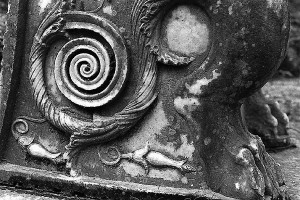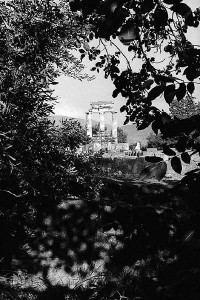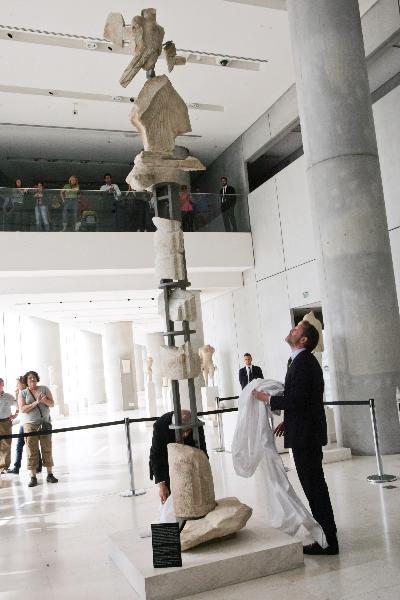Herodotus Book 2 – Discussion Questions
Books 2 & 3 Discussion Questions
1. Book 2 – Consider this remark: “As Herodotus introduces his long digression on Egypt with a reference to the conquest of the Greeks (c. I. 2), so he skillfully concludes with a similar reference.” (How & Wells, p. 256). How relevant is this comment to the Persians’ eventual invasion of Greece? Even with a satisfactory observation, one may still be wondering ‘what does Book 2 have to do with the Persian invasion of Greece?’ Thoughts?
2. Let’s look at the claim of Herodotus’ Hellenocentric point of view. What do Herodotus’ observations tell about Herodotus as a Greek? Are his observations an attempt to re-define Egypt according to Greek culture? or is Herodotus too much influenced by Egyptian culture to make accurate statements in his History?
3. Book 3 – The rise and fall of Cambyses – How does Herodotus measure the sanity of Cambyses? How does Cambyses take advice and counsel in comparison with his precedessor Cyrus? What does Herodotus mean by “custom is king of all” (3.38.4)?
4. Book 3 – The rise of Darius – How should we view the transfer of power from Cambyses to Darius? Is this a monarchy? despotism? tyranny? oligarchy?
5. Book 3 – Darius and Democedes (3.129) – What does this story show about Darius’ encounter with the Greeks? What does this story have to do with the story that ends Book 3, i.e. Zopyrus and the fall of Babylonia to Darius?
Herodotus Book I Discussion Questions
Dear Herodotus readers,
Please feel free to use these questions to guide your reading of Book I. We will use them to initiate our next discussion and conference call.
1. What part does an oracle play in the story of Candaules and Gyges? How is a curse associated with it?
2. How does Croesus’ dream about his son Atys become prophetic? Why does Croesus accept Adrastus so warmly?
3. How does Croesus read the Delphic oracles? What is he not understanding and why? When does he understand Solon’s earlier words of advice to him?
4. In chapters I.95-106, how does the story of the first Median ruler set the example for Median rulers to follow? According to Herodotus, what common theme seems to characterize the line of Median kings up to and including Astyages? (Kings of the Medes: Deiokes, Phraortes, Cyaxares, [Scythian occupation], Cyaxares regains authority, Astyages)
5. In chapters I. 107-130, how does Cyrus’ origin and upbringing compare to the line of Median kings before him? Why do you suppose Cyrus seems destined to attain supreme control over the Medes with his Persians? What main factors, according to Herodotus, contribute to this outcome?
6. As Persian armies under Cyrus’ command spread out through Asia Minor, they come into contact with various peoples, cities, and nations. How do negotiations with Ionia result? Why are the Ionian cities so vulnerable to Persian attack? What is so significant about the Sardis revolt and suppression? Why is it placed in the middle of the stories and events connected with Herodotus’ description of Ionia?
7. According to Herodotus in I. 177-200, what impresses him the most about Babylon? Why?
8. In the final chapters of Book I, Cyrus meets his match in Queen Tomyris. In this conflict, Croesus’ advice, a prophetic dream, and revenge all coincide in a decisive defeat for the Persians. How might the end of Cyrus relate to patterns of Mede and Persian rule evident throughout Book I?
9. What is your favorite story of Book I?
Victor Davis Hanson: “Life of a Soldier: Greek and Persian” – Marathon2500 Lecture #3
Professor Victor Davis Hason, Martin and Illie Anderson Senior Fellow at the Hoover Institution, delivered a wonderful lecture, “Life of a Soldier: Greek and Persian”, for the Reading Odyssey’s Marathon2500 lecture series, Wednesday, November 10, 2010 via webinar.
Professor Hanson is a classicist and an expert on the history of war. A regular contributor to National Review Online and many other national and international publications, he has written or edited sixteen books, including the New York Times bestseller Carnage and Culture: Landmark Battles in the Rise of Western Power. His most recent book is A War Like No Other: How the Athenians and Spartans Fought the Peloponnesian War. He was awarded a National Humanities Medal by President Bush in 2007.
Listen to the podcast here (note – the audio quality is mixed):
– – –
Victor Davis Hanson Biography
Victor Davis Hanson is the Martin and Illie Anderson Senior Fellow at the Hoover Institution.
Hanson was a National Endowment for the Humanities fellow at the Center for Advanced Studies in the Behavioral Sciences, Stanford, California (1992–93), a visiting professor of classics at Stanford University (1991–92), and alumnus of the year of the University of California, Santa Cruz (2002).
In 1991 he was awarded an American Philological Association Excellence in Teaching Award, which is given yearly to the country’s top undergraduate teachers of Greek and Latin. He received the Eric Breindel Award for Excellence in Opinion Journalism (2002), the National Humanities Medal (2007), and the Bradley Prize (2008).
Hanson is the author of some 170 articles, book reviews, and newspaper editorials on Greek, agrarian, and military history and essays on contemporary culture.
Books
1. Father of Us All: War and History, Ancient and Modern (2010)
2. Makers of Ancient Strategy: From the Persian Wars to the Fall of Rome (ed.) (2010)
3. Warfare and Agriculture in Classical Greece (1983; paperback ed., University of California Press, 1998)
4. Carnage and Culture (Doubleday, 2001)
5. A War Like No Other (Random House 2005)
6. The Western Way of War (Alfred Knopf, 1989; 2d paperback ed., University of California Press, 2000)
7. The Wars of the Ancient Greeks (Cassell, 1999; paperback ed., 2001)
8. Mexifornia: A State of Becoming (Encounter, 2003).
Hanson has written essays, editorials, and reviews for the New York Times, the Wall Street Journal, the International Herald Tribune, the New York Post, National Review, American Heritage, Policy Review, Commentary, National Review, the Wilson Quarterly, the Weekly Standard, Daily Telegraph, and Washington Times. He has been interviewed often on National Public Radio, the PBS Newshour, and C-Span BookTV. Currently, he is a syndicated columnist for Tribune Media Services and a weekly columnist for the National Review Online and Pajamas Media.
Hanson received a BA at the University of California, Santa Cruz (1975) and his PhD in classics from Stanford University (1980).
Professor Victor Davis Hanson, “Life of a Soldier: Greek and Persian”
Professor Victor Davis Hason, Martin and Illie Anderson Senior Fellow at the Hoover Institution, delivered a wonderful lecture, “Life of a Soldier: Greek and Persian”, for the Reading Odyssey’s Marathon2500 lecture series, Wednesday, November 10, 2010 via webinar.
Professor Hanson is a classicist and an expert on the history of war. A regular contributor to National Review Online and many other national and international publications, he has written or edited sixteen books, including the New York Times bestseller Carnage and Culture: Landmark Battles in the Rise of Western Power. His most recent book is A War Like No Other: How the Athenians and Spartans Fought the Peloponnesian War. He was awarded a National Humanities Medal by President Bush in 2007.
Listen to the podcast here (note – the audio quality is mixed):
The Lost Trails Project Showcases Geography of Herodotus
The Lost Trails web site, recommended by Marathon 2500 volunteer Thomas Tilley, has an amazing gallery of pictures from the geography of Herodotus’ histories. Here are ones from Cappadocia, Amphiareion and Delphi.
http://www.losttrails.com/pages/Hproject/hProjectxx.html
Peter Krentz “The Battle Itself” – Marathon2500 Lecture #2
Professor Peter Krentz, W.R. Grey Professor of Classics and History, Davidson College, delivered on October 12, 2010 in front of a live audience at Georgetown University and around the world to the Reading Odyssey’s remote lecture network, the Marathon2500 Lecture #2: “The Battle Itself.”
He asked how did the city-state of Athens defeat the invaders from Persia, the first world empire, on the plain of Marathon in 490 BCE? Beginning his analysis with the Athenians’ first formal contact with the Persians in 507 BCE, Krentz weaves together ancient evidence with travelers’ descriptions, archaeological discoveries, geological surveys, and the experiences of modern reenactors and soldiers to tell his story.
About Marathon2500
With the support of several of the world’s best Hellenic scholars and sports historians, Marathon2500 commemorated the 2,500-year anniversary of the Battle of Marathon with nine lectures between September 2010 and September 2011 on the cultural, intellectual and athletic legacy of the battle. Delivered before live audiences, webcast online and archived for listening on demand, Marathon2500 was a program of the Reading Odyssey chaired by Professor Paul Cartledge, A.G. Leventis Chair of Greek Culture at Cambridge University. To multiply the impact around the world, the Reading Odyssey worked with libraries, community centers, universities, colleges, high schools, museums and sports organizations to create satellite listening centers (see more about the remote lecture network here).
Marathon2500 Podcast Library
Professor Paul Cartledge and the Reading Odyssey have preserved the Marathon2500 lecture series in podcast format for readers, students and scholars.
To access the whole library, click here: http://www.marathon2500.org/podcasts
Herodotus Introduction October 2010 – podcast
Here is the audio recording for the 2010 Herodotus introductory call – a part of the Reading Odyssey’s Marathon2500 yearlong campaign to commemorate the 2,500-year anniversary of the Battle of Marathon.
Listen online or download the mp3 file to your iTunes and listen to it as a podcast on your ipod (to download you need to right click on the link).
– Andre and Bruce
P.S. If you want to join the 2010-11 Herodotus reading group (we meet monthly via phone with trained moderators and scholars), then click here for more info and free registration: http://herodotus2010-readinggroups.eventbrite.com
Herodotus Introductory Call
Dear fellow readers of Herodotus,
A reminder that our introductory call is scheduled for Monday October 11 @8pm Eastern Standard Time. Bruce Upbin and I will be moderating. The purpose of this call is to prepare the groundwork for your reading of Herodotus’ Histories. In order for that to be successful and enjoyable for you, we plan to cover numerous items including:
- how we run a conference call and our use of discussion questions
- an overview of the Landmark Herodotus and its helpful reading features (based on pp. xxxvii-xlviii, Editor’s Preface by Robert Strassler)
- an overview of the Introduction to Herodotus and his own times (based on pp. ix-xxxvi, Introduction by Rosalind Thomas)
- Herodotus’ own Introduction to Book I (pp. 3-6)
- preview of Book I (pp. li-liii)
Please note that the nature of this call is more information-based than usual and is not typical of our normal conference calls in which discussion by group members is our primary object.
Please note also the following updated call-in information printed below, especially for those of you calling in from abroad.
Looking forward to our call together,
Andre
P.S. Please note that the Marathon2500 series of lectures will continue with Peter Krentz’s “The Battle Itself” on Tuesday October 12 @ 7pmEST; website – http://marathon2500-2.eventbrite.com/





From Alexander to Cleopatra
Reading the first few chapters of Stacy Schiff’s biography Cleopatra puts me in mind of another Cleopatra, the one for whom all the Egyptian Cleopatras were named. She nearly became the first Cleopatra to rule Egypt, more than 250 years before the time of Schiff’s book, but died as a result of making the attempt. I am speaking of Alexander the Great’s sister Cleopatra, the only full sibling of the great Macedonian king. After Alexander’s death she was courted by no fewer than four of his former generals, principally because she could elevate them to near-royal status by marrying them. The last to attempt to wed her was Ptolemy I, already ensconced in Egypt where his descendants would rule for three centuries. For unknown reasons, she accepted him after refusing the others — but that acceptance provoked a rival general, Antigonus, into ordering her assassination. (Schiff incorrectly states that she was murdered by family members.) Ptolemy built his authority in Egypt largely on the back of Alexander’s legend, even stealing the king’s corpse to adorn his new capital in Alexandria. It is a fitting tribute to the power of that legend that the last ruling member of his dynasty bore the name of the conqueror’s sister.
17. November 2010 by Arrian
Categories: Arrian-Alexander, Commentary | Comments Off on From Alexander to Cleopatra